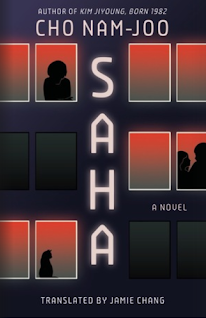Such wealth, if true, comes at a cost. Only the most highly skilled have citizenship. Those lacking talent, along with refugees, natives and criminals, are denied citizenship, forced to live in substandard housing, enduring menial jobs with inadequate compensation. The state confiscates infants of non-citizens raising them in institutional settings and determining their roles in life. “A life of doing repetitive menial labor without any assurance of compensation was like walking down a path backward. Life was terrifying and tedious. Each time they paused to take stock of their lives, they found themselves unfailingly worse off than before,” the author explains. “Saha residents thus grew more childish, petty, and simpleminded.”
A few flee to Saha Estates, just outside of Town and they become self-reliant, treasuring minimal freedoms that come with separation from Town. Saha residents are curious about one another but limit questions. “Most people who can’t tell you about their past aren’t bad,” explains one character. “It’s the ones that lie about it that are bad.” Most residents try to keep a low profile, but troubles emerge when Saha and Town residents mix. Saha becomes an easy target for police when any crime occurs, regardless of location or circumstances.
The state expects complete compliance, ensuring that any who disagree with its authority will vanish. Only a few people recall the Butterfly Riot thirty years earlier after a ship bearing non-citizens and those avoiding deportation went missing. Family members “who were suspicious began to question their own minds as time passed, telling themselves they were mistaken or dreaming. The desperate hope of recovery scattered in the wind like hearsay.” A quiet protest began, with folded white boats pasted on black construction paper along with the question: Where did the ship go? Rumors flared. “There was no ban on making paper boats, but the remarkable part was this: people had no trouble believing that there were paper boat bans and kindergarten teachers paying fines.” Town locates the woman who lost her brother on the ship and folded the first paper boat, promptly executing her.
“The Butterfly Riot came to serve as a metaphor for extreme chaos, anxiety, and fear” – and the state exerts total control, ending all committees and any other trace of mechanism for citizen input. Defiance and rebellion become rare, with most incidents ending with execution or suicide.
The state deems questions, doubt, and unconventional behavior as unacceptable for those are the first steps toward change. “Nothing inspires action like curiosity, you know,” one woman concedes.
A haunting setting, odd characters who withhold their histories, lend strange beauty to this vague and fragmented prose. Of course, it’s inevitable for Town to pursue demolition of Saha. And just as inevitable, one character responds with a violent backlash directed against the façade that is Town.
